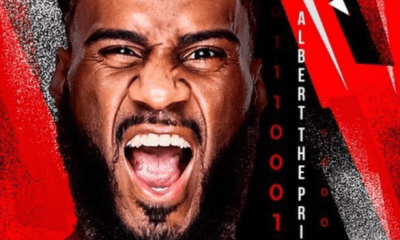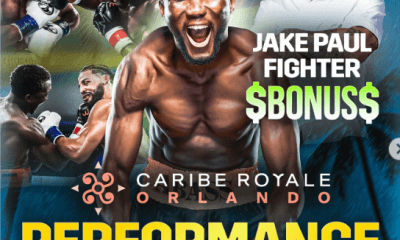Featured Articles
Art of Boxing Series: Tim “Desert Storm” Bradley

Few things compare to watching the rise of a virtual unknown boxer to world champion status and that’s what transpired in the amazing career of Tim “Desert Storm” Bradley Jr.
From the first day Bradley stepped into the outdoor prize ring in Corona until his final clash against a super star almost exactly four years ago in Las Vegas, it was like watching a classic painting in the works, a Rembrandt, a Picasso, a Renoir – layer by layer of clashing colors and resistance to opposing forces.
Not all prizefighters are the same.
Bradley, though tough as they come and as fast as a zephyr, was forced to rely on limited physical tools and a mental aptitude for studying the opposition the way a Nobel prize winning physicist might study molecules.
He is a member of a limited few who mastered the art of boxing.
It all began in the starched and heated area of Palm Springs where temperatures soar above 115 degrees on a regular basis in the summer. It can also dip below 30 on a winter night. It was around 1994 that Bradley found boxing.
Always short for his age, others picked on Bradley and he quickly retaliated with flashing fists. He was expelled twice and nearly booted from an entire school district. But he found a loophole when a friend told him about a boxing gym.
“A friend of mine was doing it. His name was Julio and we was always slap boxing around in school, just kidding around trying to hit each other in the face,” said Bradley recounting his elementary school days. “I was quick and very athletic and was always able to get to him before he was able to get to me. And he was boxing. So I begged my dad for almost two months to take me to the boxing gym.”
Bradley’s father worked across the street from a Palm Springs boxing gym and it coincidentally was the same gym his friend Julio attended. Father and son visited the gym one day. Bradley was 10 years old.
“I felt like I was walking into my heaven. I remember it was a blue heavy bag when we walked in the door to my right. I saw the ring, it was off to the right in the corner. And the speed bags were directly in front of me and they had these platforms if you were short so you could reach the speed bags. And I remember seeing all these different pictures on the wall of fighters and trainers and champions,” Bradley recalls.
After signing waivers and getting weighed, the older gentleman, a husky caretaker named OJ Kutcher from Boston, took a good look at young Bradley and tapped him lightly on the chest.
“He looked at me and said ‘oh, you’re different. There is something about you kid. You are going to be a champion’ and my dad started laughing,” said Bradley about what the old trainer said in his Bostonian accent. “My father said we just want to box. Don’t fill my son’s head up. You don’t got to sell us on this man. We just started laughing.”
It wasn’t a laughing matter once actual training commenced. Immediately Bradley excelled and surpassed the others in his ability to do more push-ups, run faster and train harder. In two weeks he got his first fight. Shortly after, he was pit against a youngster who would be a future amateur legend.
“I remember fighting Panchito Bojado in my second fight. He beat me. I fought hard as I can but I didn’t really know a lot. Then I met him again in my fourth fight in the tournament,” said Bradley chuckling at the memory. “So then I went to the junior golden gloves and he beat me again. He started boxing early, early. I fought hard but he had some experience on me. I never fought him again.”
Bradley quickly became the best fighter in the desert region. Now he set his goals on bigger game.
National Recognition
Though small in stature, Bradley was making a big impact on the amateur boxing world. Stars like Andre Ward, Andre Berto, Andre Dirrell were all future foes and obstacles for Bradley who fought at 147 and 152 pounds as he got older.
His favorite amateur fight took place in the early 2000s.
“My favorite fight was against Edgar Sanchez. He was from Arizona. He’s a lefty. He had just beaten Andre Ward in the Blue and Gold Tournament. I remember watching that fight. I fought Andre Ward in the same tournament. Andre ward beat me 2 to 1, and then Edgar Sanchez beat Andre next day. And that was the last time I saw Andre Ward lose actually,” said Bradley about his favorite amateur win. “That guy, I fought him in the Silver Gloves regionals in the finals and I remember him beating Andre Ward and he beat a couple of other guys that were top-notch from California. I remember getting in the ring with him and I ended up beating him.”
Bradley said he carefully watched Sanchez defeat Ward with an intense pressure style. He devised his own plan to defuse the aggressive boxer and when they met, he emerged the winner.
“I was able to out-box him. Set traps and just let him run into punches. I ended up beating him,” said Bradley remembering the victory. “That was probably my favorite amateur fight.”
Around this same period Bradley was trying to make his long-sought dream of making the US Olympic boxing team. He had two more opportunities when he fought in the Police Athletic League Nationals.
“I fought in the PAL Nationals semi-finals and I fought someone from the Army team. It was tied up 10-10 I think. Then, in the last round, I went straight at him pinned him on the ropes, drilled him and no doubt in my mind I won the fight. After the fight I put my hands up because I had no doubt in my mind I won,” Bradley said of the fight held at 152 pounds. “But they raised his hand instead. That’s just crushed me when I lost. My dream was to go to the Olympics at 152.”
Despite severe height disadvantages at the 152-pound weight class, Bradley felt he was capable of still making the Olympic team.
“I had one more chance and lost the challenge to Vanes (Martirosyan). I had never seen him before. He was tall and long and had good power and skill, he surprised me. He shook me. I was like wow, who is this kid,” said Bradley at the memory. “I fought against the Dirrell brothers, Andre Berto, Andre Ward, I fought all of them. But yeah, I ended up losing and that crushed me. I thought about quitting boxing.”
Enter Thompson Boxing
Months passed by and Bradley decided to partake in teen activities like partying and partying.
“I was finally doing things a teen-ager does,” said Bradley. “I had always been so disciplined and did nothing but train. But with no boxing, I started partying.”
Then one day, at a Palms Spring golf course, Bradley was attending a party when he saw a group of people with shirts that had Thompson Boxing emblems. He asked a man wearing a Thompson Boxing shirt about the company and also informed him that he was a boxer.
“This guy said put your hands up and then he slapped me in the face. Then he slapped me in the face again and we got into a little tussle. I started coming after him. I was furious. Then Ken Thompson’s son Steve ran over to help. I was trying to kill that dude. Steve (Thompson) said, I like your spirit.”
Thompson Boxing agreed to give Bradley an audition fight. But first, Bradley sought out a trainer to make the transition from amateur to professional boxing.
He found Joel Diaz and his brother Antonio Diaz in Indio.
“The Diaz brothers had a big reputation in the Valley. Julio won two world titles, Antonio fought Shane Mosley and Joel fought as well. I just trusted those guys. I knew I had to learn how to really step into the jab. Growing up in boxing you know the lingo,” said Bradley about making the transition in six months. “It was mentally draining, I had to learn distance.”
Finally, on August 20, 2004, Bradley made his pro debut at Omega Products International at Corona, California. It was an outdoor event and facing him was a guy named Francisco Martinez who was also making a pro debut.
“I fought a kid who had just turned pro too and the first jab he hit me with was like getting hit in the face with a brick. Oh my goodness. He’s not hitting me no more,” said Bradley about his first prize fight. “I knew I had more skill than he had. Joel taught me how to break down guys to the body. You got to take something out of them by beating them to the body.”
Bradley won by second round technical knockout.
To be continued…….
Photo credit: Al Applerose
Check out more boxing news on video at The Boxing Channel
To comment on this story in The Fight Forum CLICK HERE
-

 Featured Articles3 weeks ago
Featured Articles3 weeks agoThe Hauser Report: Cinematic and Literary Notes
-

 Featured Articles4 weeks ago
Featured Articles4 weeks agoOscar Duarte and Regis Prograis Prevail on an Action-Packed Fight Card in Chicago
-

 Book Review3 weeks ago
Book Review3 weeks agoMark Kriegel’s New Book About Mike Tyson is a Must-Read
-

 Featured Articles1 week ago
Featured Articles1 week agoThe Hauser Report: Debunking Two Myths and Other Notes
-

 Featured Articles2 weeks ago
Featured Articles2 weeks agoMoses Itauma Continues his Rapid Rise; Steamrolls Dillian Whyte in Riyadh
-

 Featured Articles4 weeks ago
Featured Articles4 weeks agoRahaman Ali (1943-2025)
-

 Featured Articles4 weeks ago
Featured Articles4 weeks agoTop Rank Boxing is in Limbo, but that Hasn’t Benched Robert Garcia’s Up-and-Comers
-

 Featured Articles3 weeks ago
Featured Articles3 weeks agoKotari and Urakawa – Two Fatalities on the Same Card in Japan: Boxing’s Darkest Day




















